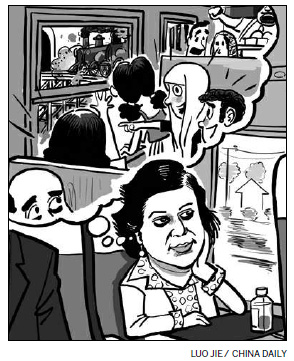View
My early-years training not required for high-speed railway
Updated: 2011-09-06 07:58
By Usha Sankar (China Daily)

 |
I took the Beijing-Shanghai high-speed railway within a few weeks of its launch. I couldn't wait to go onboard despite the advice of well-meaning friends who pointed to the delays and glitches and said I should bide my time.
But call me an intrepid railwayman's daughter. I just had to experience it. My father worked for the Indian Railways for a good 40 years and many of my most cherished childhood memories are linked to our long family journeys from the Indian capital, New Delhi, across the vast middle of the country to my hometown in the southern coastal state of Kerala.
Those were the days of steam locomotives and a 28-hour journey was the summer vacation's highlight. I vividly recall how the days leading up to our departure were filled with me and my friends weaving in and out of the rooms of our colonial-style railway bungalow, holding onto the belts of each other's frocks, imitating a train and its carriages. I always wanted to be the engine, so I could puff out my cheeks to produce the distinctive "chuk-chuk" sound of a steam engine.
Father was entitled to a first-class pass, which meant we had a cabin all to ourselves. Being the baby of the family, I always won the fight with my older sisters for the window seat. I would press my face to the window bars to feel the wind and wave to the kids, cows, buffaloes - anything that happened to be gazing at the passing train. How thrilling it was to catch a glimpse of the engine, billowing thick clouds of smoke, and the carriages in front as the train turned at a curve. Or when it entered a tunnel. Or crossed a river. Or to see the tracks merge and diverge.
As the train pulled into the station, our senses would be assaulted by an assortment of smells, sounds, and sights - from the vendors selling everything from chaya, chaya (sickly sweet tea) to typical "toilet reads" (James Hadley Chase being a favorite).
Walking to the toilet in a moving train was an exercise in fine balance and self-control, as was climbing to the top berth of the cabin, not to speak of handling food and drink without spills, and that too under father's stern gaze. Porters, whose red uniforms and shining, numbered armbands, added even more color to an already colorful and chaotic scene, carried our bags. Going from one carriage to another meant a precarious walk through the vestibule, knowing that one wrong step could mean falling on to the tracks.
We would arrive at our destination with blackened faces, sticky hair and grit on our teeth, ready for a good scrub with water drawn from the well of our ancestral home.
In contrast, the state-of-the-art high-speed rail is a byword for comfort travel. Double-glass windows ensure an almost sterile indoor environment. Despite the many stops, there is nothing, except the recorded message, to signal you are in Shandong and not Hebei, in Anhui and not Jiangsu.
The speed leaves you no chance to see the fascinating changes in landscapes. Everything goes by in a flash.
Walking from one cabin to the other is completely devoid of drama or adventure. Even at 300 km/h, your balance on the train is so good it's disappointing. It's like being on the deck of a ship and not having the funny, queasy feeling in your stomach as the vessel hits the waves.
You can eat in style in the dining car, the food served in Styrofoam boxes, with nary a risk of a spill.
You can stick in you earphones, listen to your favorite music and read a book or magazine, and disappear into your own world, to re-emerge at your destination, the color of your skin and the state of your hair intact enough to walk into Shanghai's upmarket Xintiandi district.
It's clean, comfortable and safe.
But it just doesn't seem like train travel to me.
China Daily

Specials

Jewel of the south
Zhuhai in South China has a wealth of natural allure that is open for business.

China in vogue
How Country captured the fascination of the world's most powerful fashion player

More than just a game
Mahjong is a deep-rooted cultural tradition that touches every level of society